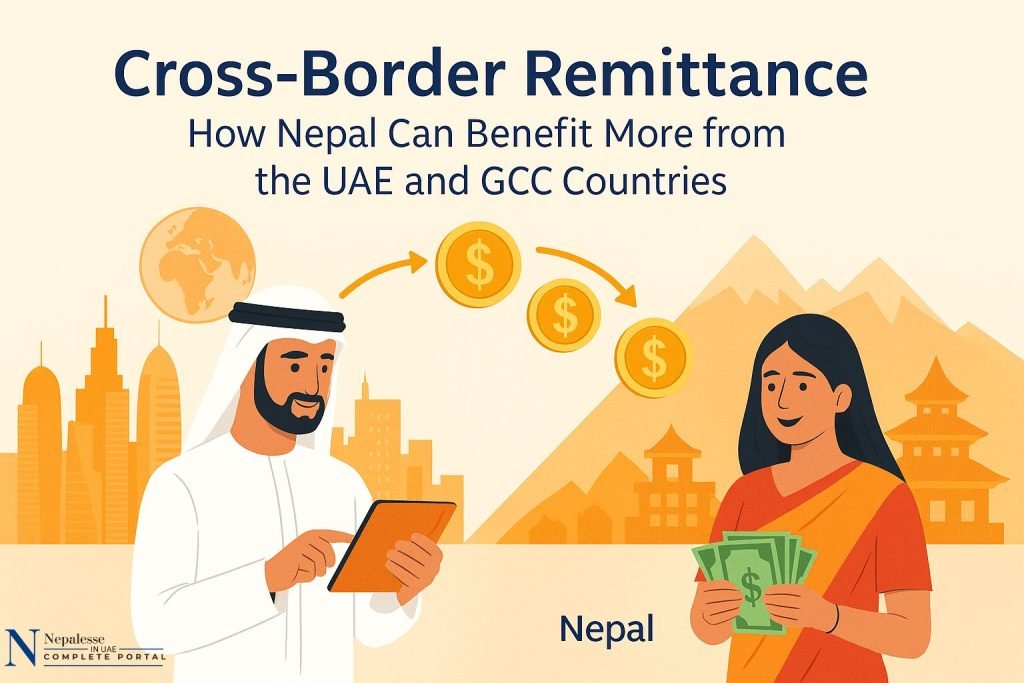Cross Border Remittance – Remittances are the lifeline of Nepal’s economy. With over 1.5 million Nepalese living and working in the United Arab Emirates (UAE) and other Gulf Cooperation Council (GCC) countries, cross-border money transfers have become a cornerstone of household survival and national economic growth.
According to Nepal Rastra Bank, remittance contributes over 23% of Nepal’s GDP, making Nepal one of the most remittance-dependent countries in the world. But the true potential of this inflow is far from fully realized.
To transform this vital stream into a sustainable development tool, Nepal needs better policies, smart financial partnerships, and community involvement.
What is Cross-Border Remittance?
Cross-border remittance refers to the international transfer of money by individuals working or living abroad to their home country. In Nepal’s case, it is the money sent by Nepali migrant workers from countries like the UAE, Saudi Arabia, Qatar, and Kuwait to their families back home. These funds are used for basic living expenses, education, healthcare, housing, and sometimes investment.
रेमिट्यान्सले विदेशी मुद्रा सञ्चिति बढाउने, ग्रामीण क्षेत्रको गरिबी घटाउने, शिक्षा र स्वास्थ्यमा लगानी बढाउने, र साना व्यवसायहरूलाई प्रोत्साहन दिने कार्यमा महत्त्वपूर्ण भूमिका खेलिरहेको छ।
तर अझै पनि धेरै नेपालीले हुण्डी जस्ता अवैध माध्यममार्फत पैसा पठाउने गर्छन्, जसले राष्ट्रलाई विदेशी मुद्रा घाटा पुर्याउँछ र कामदारहरूलाई पनि जोखिममा पार्दछ। साथै, उच्च शुल्क, वित्तीय जानकारीको अभाव, र ग्रामीण क्षेत्रमा बैंक पहुँचको कमीले समस्या थपिएको छ।
यसलाई सुधार गर्न नेपाल सरकार र बैंकहरूले:
वैधानिक र डिजिटल माध्यमबाट पैसा पठाउन सजिलो र सस्तो बनाउने,
रेमिट्यान्समा आधारित बचत तथा लगानीका अवसरहरू सिर्जना गर्ने,
वित्तीय साक्षरता अभियान सञ्चालन गर्ने,
खाडी राष्ट्रका बैंकहरूसँग सहकार्य गर्दै पारदर्शी प्रणाली विकास गर्ने प्रयास गर्न आवश्यक छ।
यदि यी उपायहरू अपनाइए भने, वैदेशिक रोजगारबाट आउने रेमिट्यान्सले न केवल व्यक्तिगत परिवारको जीवनस्तर सुधार गर्छ, तर देशको समग्र आर्थिक समृद्धिमा ठूलो योगदान पुर्याउन सक्छ।
Why UAE and GCC Are Crucial for Nepal
The UAE and GCC host a significant share of Nepal’s migrant workforce. From construction and security to hospitality and domestic services, Nepalese workers are contributing to the economies of these nations while supporting families back in Nepal.
The UAE alone accounts for nearly 25% of Nepal’s total remittance inflow. This makes collaboration between both regions not only logical but critical.
Benefits of Cross-Border Remittance for Nepal
- Foreign Currency Reserves
Legal remittance increases Nepal’s reserves of stable foreign currencies like AED, SAR, and QAR, which helps maintain balance of payments. - Poverty Reduction
Regular remittance helps families afford education, food, and health services, especially in rural Nepal. - Economic Stimulation
Inflow of money raises consumption, creates demand, and stimulates small businesses and employment. - Education and Social Mobility
With better income, families can afford to educate their children, contributing to long-term human capital development.
Challenges in the Remittance Ecosystem
Despite its size, Nepal’s remittance sector faces major hurdles:
- Hundi (Illegal Transfer Channels): Many workers opt for informal methods due to ease or better exchange rates, depriving Nepal of foreign reserves.
- High Transaction Fees: Formal channels can be expensive, pushing workers toward illegal means.
- Limited Financial Literacy: Many recipients spend money rather than save or invest it.
- Lack of Access in Rural Areas: Families in remote villages often lack banking facilities or awareness of digital tools.
How Nepal Can Benefit More from UAE & GCC Remittances
1. Promote Legal Digital Channels
Encourage the use of mobile wallets, banking apps, and fintech platforms for safe, fast, and cheap money transfers.
2. Offer Incentives
Nepal Rastra Bank and financial institutions can reward users who remit legally—through cashback, reward points, or savings interest.
3. Create Migrant-Focused Investment Options
Launch remit-to-invest models such as diaspora bonds, cooperative shares, or micro-entrepreneurial funding schemes.
4. Empower Returnees
Provide skill-based entrepreneurship training and startup support to returnee migrants.
5. Bilateral Banking Agreements
Establish cross-border banking arrangements between Nepal and GCC nations to facilitate direct transfers, credit access, and secure salary payments.
How Nepalese Banks Can Collaborate with UAE Banks
Nepali banks should partner with UAE-based banks and exchange houses to build smoother and cheaper remittance systems. Here’s how:
- Co-branded products like debit cards and digital wallets
- Joint remittance services with low transaction fees
- Nepal bank counters in UAE branches
- Direct salary deposit partnerships
- Shared digital platforms for mobile banking and real-time tracking
These efforts will not only improve ease of transfer but also help track remittance data for policy development.
Powered by the Nepalese in UAE Portal
At NepaleseinUAE.com, we are committed to empowering our community through timely information, practical resources, and strong advocacy. Our portal provides:
- Remittance guidance
- Banking and job-related resources
- Visa and travel updates
- Legal awareness campaigns
We believe in building a stronger, safer, and financially empowered Nepali diaspora in the Gulf.
Conclusion
Cross border remittance is more than just money—it’s a lifeline for families and a pillar of national stability. Nepal has a golden opportunity to turn these flows into formal, productive, and growth-oriented tools.
With strategic partnerships, community involvement, and policy support, we can ensure that every dirham sent from the UAE helps build a stronger Nepal.
Are you a Nepali working in the UAE or GCC? Send money home the legal way, invest wisely, and follow us at NepaleseinUAE.com for guidance, updates, and support.

